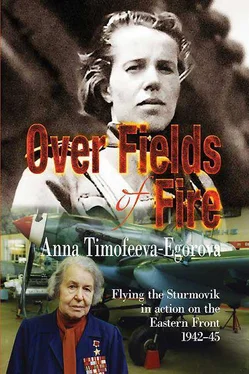And off we went. A solid morass of mud lay under the wings. Not all of us managed to break out of its clutches. Seven machines out of nine took off for the combat sortie — two of them nosed over during the run-up…
Our course lay towards Eltigen. This fishing village was situated between the Chourbashskoye and the Tobechikskoye Lakes — where the spurs of the coastal hills come up against the sea. The port of Kamysh-Bouroun was situated next to Eltigen, a little bit to the north of it. The Fascist naval ships were based in the port. But this time we carried not bombs but containers of ammo, food, medicine. Stormy weather was preventing the timely supply of reinforcements to the bridgehead, and this was weakening the Eltigen landing contingent. Our task was to drop the load precisely on the bridgehead. So as not to miss we would have to take everything into account: wind speed and direction, and the speed of our own planes. And meanwhile the Fascists were shooting at us from the ground with all kinds of weapons — so we would have to return fire as well. But that time we dropped the containers of ammo, food and medicine to the landing troops at Eltigen right on target!
Now we would fly from the Taman Peninsula, cleared of the Hitlerites, to the Kerch Peninsula. One day I was ordered to lead a group of six Sturmoviks to the area of Baksy, north to the Mitridat Hill. But we hadn’t been assigned an actual target and had been set the task of flying along the frontline, finding a target of opportunity for ourselves and giving it a whole-group ‘workout’.
And now we were flying. I stubbornly repeated through the radio the same word for my wingmen: “Manoeuvre, manoeuvre, manoeuvre!” I wasn’t snoozing either — I threw the Sturmovik from side to side, slowed down and sped up from time to time. I knew if the ack-ack guns struck, I as the leader would get the largest share. And now they opened up. It flashed through my mind automatically: that means something is concealed down there. I looked closely — down there, in the gardens there were disguised tanks! I went into a dive: there was a tank in my gun-sight and I launched rockets. “Attack, with a manoeuvre!” I yelled to my wingmen via the radio.
Now I see a loaded truck in the gun-sight. I pressed the triggers and the fire of my automatic cannons poured onto the target. The earth quickly came closer: it seemed to be rushing towards me. Again my fingers touched the buttons triggering the launch of rockets, and at the very same moment the lethal missiles dashed towards the ground from under my plane’s wings. I pulled the control column and the Sturmovik obediently pulled out of the dive. Having dropped a batch of bombs, I switched the machine to climbing, and my aerial gunner Starshina Makosov began to strafe the Fascists rushing about below with his large-calibre machine-gun. Now that was an attack!
Having finished working over the target we turned back but at the very same moment the Messers pounced on us. One of their groups engaged our escort fighters, and another struck at the Ils. We formed a defensive circle stretched towards our lines. But there were only six of us against ten German fighters — the odds were clearly unequal. I saw two fighter-planes fall into the sea a bit aside from us: one with red stars, another with a black-and-white cross on its fuselage. Before my eyes an Il-2 hit the water and went to the bottom…
We had to hold out, hold out all costs! And we shot at those who were heedless, who slid forward and exposed their bellies to our cannons. One Fritz emitted smoke and pulled aside. One more was struck so badly that he went straight to the ground like a stone…
The Messers retired, but the German flak guns opened up at us again. A scorching splinter of flak passed in front of my face, having pierced the Plexiglas cheek of the cockpit. Glancing back I saw blood on the reinforced glass panel separating me from the gunner’s cockpit. Was Makosov wounded? And at the same time I felt the plane drifting to the right — the rudder control rods had been smashed. From bad to worse! My wingmen were on their way to the East, home, and my plane was no longer obeying me, it was turning west, towards the enemy. I felt shivers treacherously running down my spine… I was on my own.
I strained all my strength and skills to straighten out my Il. And on top of that the ‘skinnies’, sensing easy prey, smothered me from all sides and kept peppering my badly damaged machine with the bursts of fire! Nevertheless, I managed to turn the Sturmovik towards our lines. The engine missed time and again but kept pulling, still pulling, holding on! Clenching my teeth, I held on too and keep steering my unruly machine. Losing altitude I flew at the lowest speed possible. The earth was coming closer and closer but I still needed to cross the Kerch Straits!
Suddenly I saw some objects fly up from the trenches. Hand grenades? No, not that — it was helmets, thrown up by our soldiers who were rapturously greeting my red-starred plane. They were happy for me, for the infantry’s beloved Sturmovik . I’d made it to our lines after all. I’d made it after all…
When I was above the Straits our fighter planes came in time to drive my pursuers away. At last I saw my aerodrome and landed the machine on the run without closing in by the rules. I didn’t care about the rules now: I just wanted to land my plane that was barely staying in the air!
…Silence. How wonderful silence on the ground can be! But what was that? My hands were bloody for some reason, and my blouse was bloody as well… It appears that I hadn’t noticed being wounded by the shell splinter during the battle… And what about Makosov? He was alive, wounded but alive! My heart soared…
Airmen ran across the aerodrome field to my plane, an ambulance car with a red cross rolled at full speed, a tractor followed it to tow the crippled plane away from the airstrip as soon as possible. Swallowing tears I held onto its wing and whispered: “Thank you, my friend Ilyusha ”.
They put Makosov on a stretcher. He tried to get up and repeated over and over:
“Comrade Lieutenant! Don’t send me to hospital — let our doctor treat me. I’ll recover soon and fly again. Don’t get yourself a new gunner!”
“Alright, alright, Makosov”, I calmed the gunner. “I’ll ask them to treat you in our [Aerodrome Services] Battalion medical unit. Try to get well quickly. I’ll wait for you!”
The next day I went to see my gunner and suddenly heard someone sobbing. I came closer and saw the gunsmith Dousya Nazarkina sitting on a shell crate and crying bitterly, her face buried in her knees. “Someone’s insulted her!” I thought, but then immediately rejected my assumption. Dousya was loved very much by everyone in the regiment. The frolicsome, cheerful and very hard-working armourer had become highly-regarded by everyone. It was sheer pleasure to look at her when she was hanging bombs and rockets, loading cannons and machine-guns. Dousya would flash around a Sturmovik in her sun-faded but always clean and ironed blouse, with extraordinary speed and deftness. I’m still puzzled how she managed to hang hundred-kilo bombs under the fuselage by herself. But Dousya used to joke: “I used to work at the ‘Krasnyy Bogatyr’ Works in Moscow before the war and even trained in a weight-lifting club!”
And now the ‘weightlifter’ was in tears… I shook Dousya by the shoulder but she did not respond. Then I sat next to her on the crate, took Dousya’s head in both hands, lifted it a bit and lay it on my knees. The field cap Dousya was squeezing in her hand was wet and crumpled. I silently stroked the armourer’s head. About ten minutes elapsed, and then she, not wiping away her tears, began to tell me about her love for Serezha Bondarev. Being a plane mechanic, he had flown today with the pilot Khmara as an aerial gunner. They hadn’t come back from the mission…
Читать дальше












